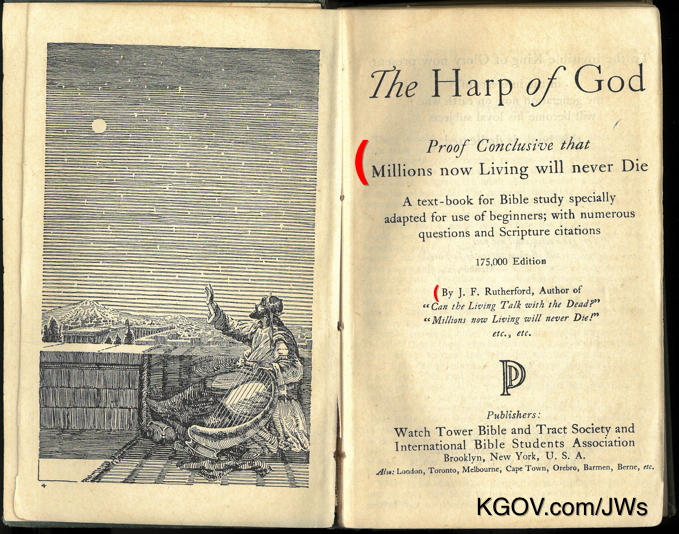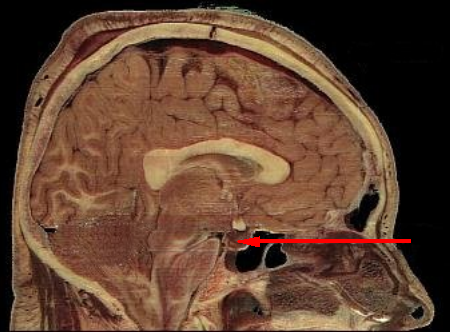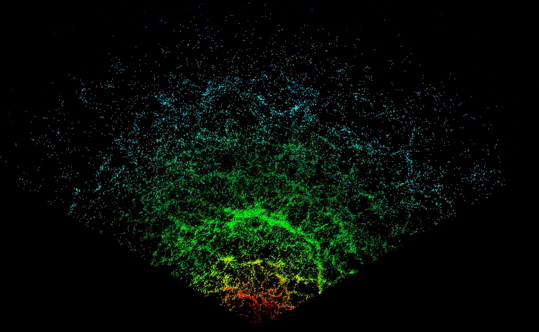* About this Interview and on this Page: We a'e eagerly looking forward to the coming of our Lord Jesus Christ, but that should not make us vulnerable to fake news, even Christian fake news, and confused Bible teaching...
- Rejecting The Harbinger's Claim of Divine Signs (far below)
- Leading End Times Preachers All Dyin' of Old Age (just below)
- List of the Erroneous Calculated Dates
- Last Days vs. Last Minutes
- The Timing of Christ's Return has Changed
And related BEL Resources:
- Debunking the Blood Moon Claims with a Creationist Astronomer
- Bob Schedules Meet with End Times Preacher 9/24/17 (after predicted rapture)
- BEL Y2K Survival Kit Cuts Power to House (so our wives don't think that were nuts)
- Two Decades After 9/11 End Times Predictions Still Pending
- Bob Enyart's End Times Seminar filmed four days after 9/11 to a live and "still here" audience!
 * 2016 Update: If Christian brother Jonathan Cahn would have paid closer attention to Bob's comments in this interview, and had taken this written show summary to heart, he could have averted the embarrassment of his failed prophecy of economic collapse for 2015. Further, at rsr.org/blood-moons#rsr-vs-the-apocalypse-gurus we make our argument that while the predictions of the End Times gurus are systematically wrong, here at Bob Enyart Live and RSR our biblically-based general and science predictions have an uncanny way of being confirmed!
* 2016 Update: If Christian brother Jonathan Cahn would have paid closer attention to Bob's comments in this interview, and had taken this written show summary to heart, he could have averted the embarrassment of his failed prophecy of economic collapse for 2015. Further, at rsr.org/blood-moons#rsr-vs-the-apocalypse-gurus we make our argument that while the predictions of the End Times gurus are systematically wrong, here at Bob Enyart Live and RSR our biblically-based general and science predictions have an uncanny way of being confirmed!
This is a Special Edition of Real Science Radio.
* LIST OF LEADING END TIMES PREACHERS
* Leading End Times Preachers All Dyin' of Old Age: The modern end-times movement really took off way back in the 1970s and 1980s. Did all the big-name end times teachers think that they would still be preaching in their 70s, 80s, and 90s, and as a group dying of old age? No, of course not. We discuss this in a series on BEL beginning on May 14th, 2018 for the 70th anniversary of the modern State of Israel. See specifically the program, How to turn perfectly good Scripture into bad predictions. We love these guys, and Bob personally (and literally) sat at the feet of Chuck Smith and Chuch Missler for scores of Bible studies. But clearly, their dying of old age indicates that they got something very wrong in their interpretation of the headlines and the Scriptures...
- Tim LaHaye (90, 1926 - 2016, Left Behind Series)
- Chuck Smith (86, 1927 - 2013, founder, Calvary Chapel)
- Chuck Missler (83, 1934-2018, end times teacher)
- Harold Camping (92, 1921-2013, founder, Family Radio)
- Hal Lindsey (91, b. 1929, Late Great Planet Earth)
- Noah Hutchings (92, 1922-2015, six decades on Southwest Radio Church)
- Irvin Baxter (75, 1945-2020, Endtime Ministries) as described by B.E.
- John Hagee (81, b. 1940; recent error: Blood Moons)
- Jack Van Impe (88, 1931-2020; had celebrated his 60-year anniversary with Rexella; began in ministry in 1948 and as a preacher in 1952).
See Enyart discuss all this with WND readers.
* 2020 Update:
* List of the Erroneous Calculated Dates: Here's an example of the never-ending, and so far, universally incorrect, calculating of end times dates by a Christian author, and then another example by the leader of the Jehovah's Witnesses...

* Remember When -- The Dates & The Headlines: Countless Christians were told that the following dates were significant because they represented end-times markers. Thousands of news headlines were misinterpreted prophetically to arrive at these erroneous dates. Of course the Lord will return one day, and hopefully, soon. But confused teachers used events and dates like these to confuse others.
- 1850 for the ascent of the Anti-Christ (calculated by London's protestant scholar Robert Fleming, V.D.M in 1701 by adding to 608 A.D. the "1260 days" of Revelation, converting each day to a year
- 1948 the nation of Israel is reconstituted in the Middle East
- 1957 European Common Market (ECM) established with six nations
- 1973 The ECM added three more nations, prophecy teachers added this up to Daniel's "ten toes"
- 1980 In the decade of the 80s, three more nations joined the ECM, still adding up to Daniel's ten toes
- 1993 The European Union (EU) was formed with 12 nations
- 1995 Ten Nation European Alliance (WEU) formed, claimed to be Daniel's 10-toed prophecy
- 2001 Islamic terrorist attack on America, claimed to represent the end times
- 2010 Ten Nation European WEU decides to disband claimed as major fulfillment of prophecy
- 2011 Ten Nation WEU officially disbands and absorbed into the EU
- 2016 The now 28-nation EU begins to unravel with the UK's Brexit and Italy's no-confidence vote
 - 2020 With the U.K. officially out, the EU is down to 27 nations.
- 2020 With the U.K. officially out, the EU is down to 27 nations.
* Counting Backwards From 2020: It's been...
1,520 years since A.D. 500, the year when Irenaeus, et al, predicted that Jesus would return
1,220 years since A.D. 800, the year when Sextus Julius Africanus predicted Armageddon
1,020 years since A.D. 1000, the year when Pope Sylvester II, et al, predicted the beginning of the end
176 years since 1844 when the early 7th Day Adventists believed Christ would have returned
170 years since 1850 when Robert Fleming, writing in 1700 A.D., calculated the anti-Christ's reign
142 years since 1878 when Jehovah's Witnesses said would be the last year for the church on earth
116 years since 1914 when the Jehovah's Witnesses said it would be the end
99 years since 1921 when the JW's said millions now living will never die
84 years since 1936, the year when Herbert W. Armstrong predicted the end (updated to 1943, '72, '75)
72 years since 1948 when Israel became a nation again after World War II
63 years since 1957 when the European Common Market was Daniel's ten-nation alliance
39 years since 1981 when Chuck Smith, et al, taught the seven-year tribulation would begin
35 years since 1985, the year Lester Sumrall wrote about in his book, I Predict 1985
38 years since 1982, the year Pat Robertson predicted would be the end of the world
32 years since 1988 a generate after Israel became a nation with 88 reasons for the Rapture in '88
26 years since 1994, the year that Harold Camping predicted would start the great tribulation
23 years since 1997, the year that Bishop James Ussher predicted would be the end of the world
 20 years since 2000, when the Y2K bug was predicted to herald the end times, and when and Lester Sumrall predicted would be the end, and when Jerry Falwell predicted would see God's judgment.
20 years since 2000, when the Y2K bug was predicted to herald the end times, and when and Lester Sumrall predicted would be the end, and when Jerry Falwell predicted would see God's judgment.
19 years since 2001 when America was attacked on 9/11
13 years since 2007, the year Pat Robertson wrote in 1990 would be the end
6 years since 2014 when the blood moons were supposed to indicate the end times.
* Last Days vs. Last Minutes: Many years ago my call screener put through to me someone who told him that the diseases in the world were evidence of the Last Days. The guy, Jim from Columbus, Ohio asked me, "Bob, where do you stand on the Ebola virus?" I answered, "I'm against it." Looking at the news events listed above, when they occurred popular prophecy teachers claimed they represented end times prophecies. Well, it's been a long time since. The "end times" is a lot longer than any of them would have predicted. As we say at Denver Bible Church to those misinterpreting last-days prophecies, "From now only, will you only tell us about the Last Minutes?" Afterall, the most famous end-times teachers are all dying of old age and these last-days interpretations have been around for more than half a century.
* The Bible shows the Timing of Christ's Return has Changed: You can link directly to this section as kgov.com/second-coming-timing or kgov.com/second-coming-timing-has-changed. For most folks, before reading this list we recommend praying, "Lord, if Your Word clearly teaches something that I will tend to reject because it conflicts with some of my biases, please help me to be humble before You and willing to challenge my preexisting beliefs."
- God Views the End Times Calendar as Changeable: "I, the LORD, will hasten it in its time" Isa. 60:22
- Believers Can Change the Time of Christ's Return: Peter wrote that believers too should set about, "hastening the coming of the day of God" 2 Pet. 3:12
- Even the Length of the Tribulation will Change: Jesus said that, "those days will be shortened" Mat. 24:22
- Like God Shortening His Punishment of Israel: the Old Testament precedents for God shortening the coming Tribulation, include, "choose... seven years... Or... three months... Or... three days' plague..." And David said... "His mercies are great..." So the Lord heeded the prayers for the land, and the plague was withdrawn from Israel. 2 Sam. 24:12-17, 25
- For God Promised Mercy Regardless of Prophecy If...: "The instant I speak concerning a nation [Israel], to destroy it, if that nation against whom I have spoken turns from its evil, I will repent of the disaster that I thought to bring upon it." Jer. 18:7-8 (see also a dozen more Category 1 verses like that one, including the next, about Nineveh)
- Again, Get This Down, God Promises Mercy Regardless of Prophecy If: "...forty days, and Nineveh shall be overthrown! [But then] they turned from their evil way; and God repented from the disaster that He had said He would bring upon them, and He did not do it." Jonah 3:10
- Before You Get Through Israel's Villages: "...I say to you, you will not have gone through the cities of Israel before the Son of Man comes." Mat. 10:23 (yet this did not happen, because as warned, God changed His plan for Israel; Jer. 18:9-10; Rom. 11)
- Some of You Won't Die Until: "there are some standing here who shall not taste death till they see the Son of Man coming in His kingdom." Mat. 16:28 (this didn't refer to the Transfiguration which occurred about a day later; see too Mark 9 and Luke 9; yet they all did die, because God changed His plan for Israel, and grafted in the Gentiles; Jer. 18:9-10; Rom. 11)
- John Might Not Die Before: "Then this saying went out among the brethren that this disciple would not die. Yet Jesus did not say to him that he would not die, but, 'If I will that he remain till I come, what is that to you?'" John 21:23
- This Generation Won't Pass Until: "Assuredly, I say to you, this generation will by no means pass away till all these things take place." Mat. 24:34 (yet that generation did pass away, because God changed His plan for Israel and instead grafted in the Gentiles; Jer. 18:9-10; Rom. 11)
- Before Paul, Believers Sold their Homes: "all who were possessors of lands or houses sold them, and brought the proceeds of the things that were sold, and laid them at the apostles' feet; and they distributed to each as anyone had need." Acts 4:34-35; 5:1-2 (this behavior, appropriate at the time, changed after Paul's Acts 9 conversion when God grafted in the Gentiles)
- Christ's Soon Return Permeated His Teachings: "Sell what you have and give alms" Luke 12:33; "And everyone who has left houses... or lands, for My name's sake..." Mat. 19:29. "...do not worry about your life, what you will eat; nor about the body, what you will put on" Luke 12:22. The "ravens... neither sow nor reap" yet "God feeds them" Luke 12:24. "He commanded them to take nothing for the journey except a staff——no bag..." Mark 6:8. "Provide neither gold nor silver nor copper in your moneybelts..." Mat. 10:9. "Sell all that you have and distribute to the poor, and... come, follow Me" Luke 18:22. (yet He did not return soon, as He had warned that He may change His mind). And even that Jesus went about all Galilee preaching "the gospel of the kingdom" Mat. 4:23; 9:35; 24:14; Mark 1:14-15 and Jesus said, "The time is fulfilled, and the kingdom of God is near. Repent and believe in the gospel [of the kingdom]" Mark 1:15; Mat. 3:2; 4:17
- With Homes Sold, They Became Poor: Remember that "all who were possessors of lands or houses sold them... and they distributed to each as anyone had need." Acts 4:34-35; 5:1-2
- It Was the Converts of the Twelve Who Fell into Poverty: 1 Cor. 16:1–4; 2 Cor. 8:1-9:15; Gal. 2:10; Rom. 15:25–31; Acts 11:27–30; 24:17 for communism quickly fails; the sale of pesonal property was to be a short-term tactic to survive the Tribulation and enter the Kingdom; the Postponement led to their poverty.
- Paul's Converts Kept Their Homes and Provided Relief: (The "apostle to the Gentiles" was able to raise relief from his converts) 1 Cor. 16:1–4; 2 Cor. 8:1-9:15; Gal. 2:10; Rom. 15:25–31; Acts 11:27–30; 24:17 to support the believers in Judea who fell into poverty; they hadn't immediately become poor after selling their property, but after the delay in Christ's previously-expected soon return
- God Warned He may Not Give Israel their Kingdom as Prophesied: "And the instant I speak concerning a nation and concerning a kingdom, to build and to plant it, if it does evil in My sight so that it does not obey My voice, then I will repent concerning the good with which I said I would benefit it." Jer. 18:9-10 (see also Jer. 18:7-8; for God, unlike a juvenile judge, does not make empty threats)
- One Year Probation Followed Three-Year Earthly Ministry: "'Look, for three years I have come seeking fruit on this fig tree [figuratively, Israel] and find none. Cut it down...' But he answered and said, 'Sir, let it alone this year also, until I dig around it and fertilize it. And if it bears fruit, well. But if not, after that you can cut it down.'" Luke 13:7-9
- Daniel's Seventieth Week Suspended: The prophet Daniel's 490-year prophecy (Dan. 9:24-27) of 483 years between the command to rebuild Jerusalem (by Artaxerxes Neh. 2:1-8) until the execution of the Messiah, followed by the next seven years that were to be the Great Tribulation (Mat. 24:15; Mark 13:14); but Israel rejected their resurrected Messiah so as God had warned (Jer. 18:9-10) He changed what He had prophesied for them by postponing both the tribulation and the Kingdom it would usher in.
- After the Cross Ten Signs of the Tribulation Were Evident: See chapter 9 of kgov.com/the-plot for details; in the year beginning with Christ's death the signs of the Great Tribulation that occurred included the outpouring of the Holy Spirit, signs and wonders, earthquakes, believers beaten by councils, the laying on of hands to imprison, arrests leading to occasion for testimony, martyrdom, expectation of an abbreviated end times and of the soon appearance of signs in the sun, moon, and stars, irresistible wisdom displayed.
- Fulfillment of Prophetic Seven Feasts of Israel Suspended: God ceased the apparent fulfillment of the Feasts of Israel on their very calendar days, for Jesus died on the day the Jews killed the Passover lamb; He was in the tomb during Unleavened Bread; raised on Firstfruits; gave the Holy Spirit on Pentecost; and He "tabernacled" among us (John 1:14, with the Greek saying not "dwelt" but "tabernacled"), likely fulfilling that feast; but the remaining two feasts including Trumpets are yet awaiting fulfillment, as God postponed His prophetic plan for Israel.
- Jesus Hardly Spoke About the End Times Until Just Before the Cross: The apocalyptic Olivet Discourse happened when Jesus said to His disciples, "You know that after two days is the Passover, and the Son of Man will be delivered up to be crucified." Mat. 26:1-2
- God the Son Didn't Know the Timing: and neither did God the Holy Spirit but only the Father, for it is in His purview to decide when Jesus shall return. Just Google: open theism verses, and see Category 15, which includes the following:
The Holy Spirit, third person of the Godhead, did not know something that the Father knew, namely, the planned day and hour of the Second Coming Mark 13:32 and of course that lack of knowledge did not negate His divinity for the quantitative attribute of omniscience is not like the absolute qualitative attributes; likewise, no man, no angel, nor even the Son knew, for "of that day and hour no one knows, not even the angels of heaven, but My Father only" of the persons of the Godhead, with even the Second Person not knowing the timing of the Second Coming which was in the purview of the Father alone Mat. 24:36.
- Israel's End Times Signs Not Relevant Today: When the Lord temporarily set aside Israel's Kingdom and their covenant of circumcision and grafted in the Body of Christ with its covenant of grace (this is not replacement theology), God's new sign, so to speak, of the end of the Body of Christ's time on earth is the "fullness of the Gentiles", whatever He means by that, be it a billion believers to populate heaven, or the Gospel preached worldwide, or holiness within the Body, etc.; so that, when "the fullness of the Gentiles has come in" then God will graft Israel back in again, "for God is able to graft them in again", and thereby resume the countdown on their end times calendar; Rom. 11:11-32.
- To Read More about the Changed Date of the Second Coming: Click to get a copy of Bob Enyart's life's work, The Plot: An Overview of the Bible is the Key to its Details and review the list of 33 Categories of more than 500 scriptures at opentheism.org/verses.
* Tonight on Denver's 7News: Bob Enyart said on 7News to Colorado's ABC audience that Christians who say that the death penalty is immoral are unwittingly accusing God the Father of being unjust, for He required a payment of death to pay for the sin of the world. We thank God for the opportunity to promote the principles of the Gospel on the nightly news! Please also see AmericanRTL.org/death-penalty.
Now Back to the Harbinger:
* Enyart & Cahn Agree on the Theme of The Harbinger: Bob Enyart interviews Jonathan Cahn, the NY Times bestselling author of The Harbinger. Bob appreciates Cahn's warning to an America defiant of God but Enyart disagrees with Cahn's claim that 9/11 was a specific sign from God. See just below Bob's notes regarding his reasons for disagreeing with Jonathan Cahn's claims of a specific divine message in the events following the Attack on America.
* Rejecting The Harbinger's Claim of Divine Signs: (This is not meant to be harsh, for we love and appreciate Jonathan Cahn, and though airing a daily radio talk show, we don't want to be like David who became battle hardened; yet, this is meant to be direct.) The last nine minutes of audio on today's program were recorded twelve years ago at an End Times seminar conducted in Winona Lake, Indiana only four days after Sept. 11, 2001. Bob Enyart predicted that sincere Christian authors (who love and honor God and preach the Gospel) would find a Bible passage with a few uncanny similarities to 9/11, and so would claim that therefore Al Qaeda's attack on America was a sign from God. Consider Jonathan Cahn's few parallels (which get repeated often) from Isaiah 9:10 to 9/11 events. In the audio from September 2001, Bob Enyart illustrates how easy this is to claim fulfillment of a prophetic pattern when, compared to the Harbinger, he quoted more, and more significant, 9/11 parallels, not from Isaiah but from Revelation 17 and 18. As one small example, the greater parallel between Scripture and 9/11 is not a sycamore and a fir tree, but Washington DC and NYC debating the patent rights of murdered unborn children so that "the merchants of the earth" can buy and sell the "the bodies and souls of men." So Bob intentionally misinterpreted the Scriptures to show how easily (and even innocently) this is done, and while Cahn's parallels get to select from events over a period of years, Bob's many more prophetic parallels were all fulfilled on the very day of September 11th.
Harbinger Expert Critic says:
"Bob, I read your analysis this morning
and it was dead right on every point."
- David James, 3/24/13
 The Internet hasn't existed for 2,700 years. Jonathan Cahn's nine harbingers are based on a quote in the Bible of men defiant against God, who, after suffering God's judgment, repeated in utter ignorance, "The bricks have fallen down, but we will rebuild with hewn stone; the sycamores are cut down, but we will replace them with cedars" (Isaiah 9:10). If the web had been forever, a Google search would probably return countless pages recording, after attacks, utterances throughout Judeo-Christian history of that quote. About 18 minutes into the program, Jonathan Cahn says about Isaiah 9:10 and the December 7, 1941 attack on Pearl Harbor that back then, "you don't have anyone quoting the Scripture of judgment." Perhaps, perhaps not. In the very center of the Internet's page of Pearl Harbor Quotes we read Isaiah 9:10, not in the NIV or NASB, because those versions were translated later, but in the King James Version.
The Internet hasn't existed for 2,700 years. Jonathan Cahn's nine harbingers are based on a quote in the Bible of men defiant against God, who, after suffering God's judgment, repeated in utter ignorance, "The bricks have fallen down, but we will rebuild with hewn stone; the sycamores are cut down, but we will replace them with cedars" (Isaiah 9:10). If the web had been forever, a Google search would probably return countless pages recording, after attacks, utterances throughout Judeo-Christian history of that quote. About 18 minutes into the program, Jonathan Cahn says about Isaiah 9:10 and the December 7, 1941 attack on Pearl Harbor that back then, "you don't have anyone quoting the Scripture of judgment." Perhaps, perhaps not. In the very center of the Internet's page of Pearl Harbor Quotes we read Isaiah 9:10, not in the NIV or NASB, because those versions were translated later, but in the King James Version.
Cahn chose to present his message in a book of fiction. Not unlike the folks who think Star Wars is real, for many readers, Cahn's literary device blurs the distinction between truth and fiction. The requisite suspension of disbelief necessary to enjoy the elements of the story, a wary reporter, a surprised liaison, and an unnamed prophet with curious ancient seals, works to bias the reader who emerges from the novella into the real world lacking the desire to expend the mental energy necessary for an objective consideration of The Harbinger's theological claims.



 * Mold Finds Most Efficient Route: On the slimiest Real Science Radio program in years, hosts
* Mold Finds Most Efficient Route: On the slimiest Real Science Radio program in years, hosts 










